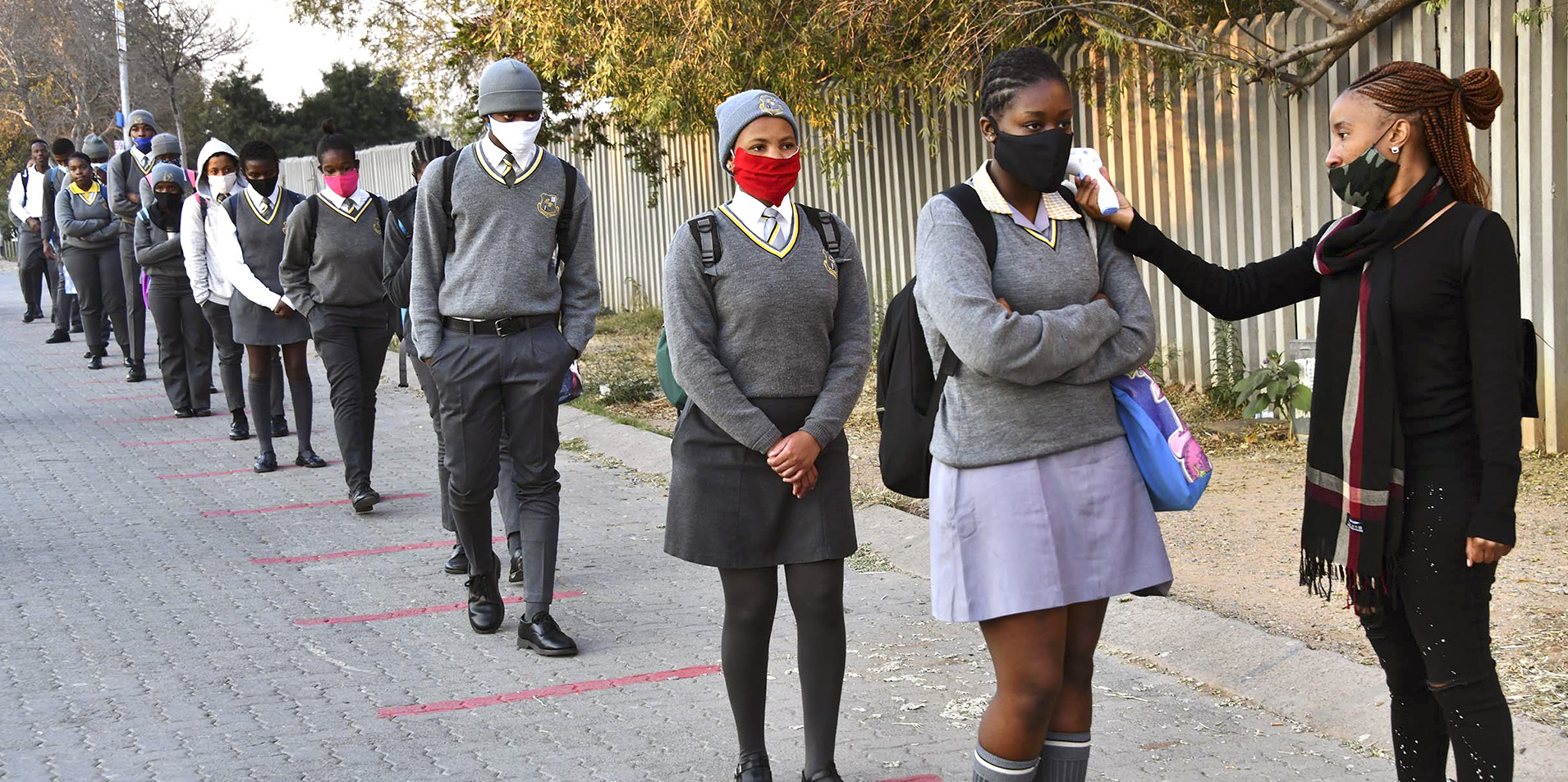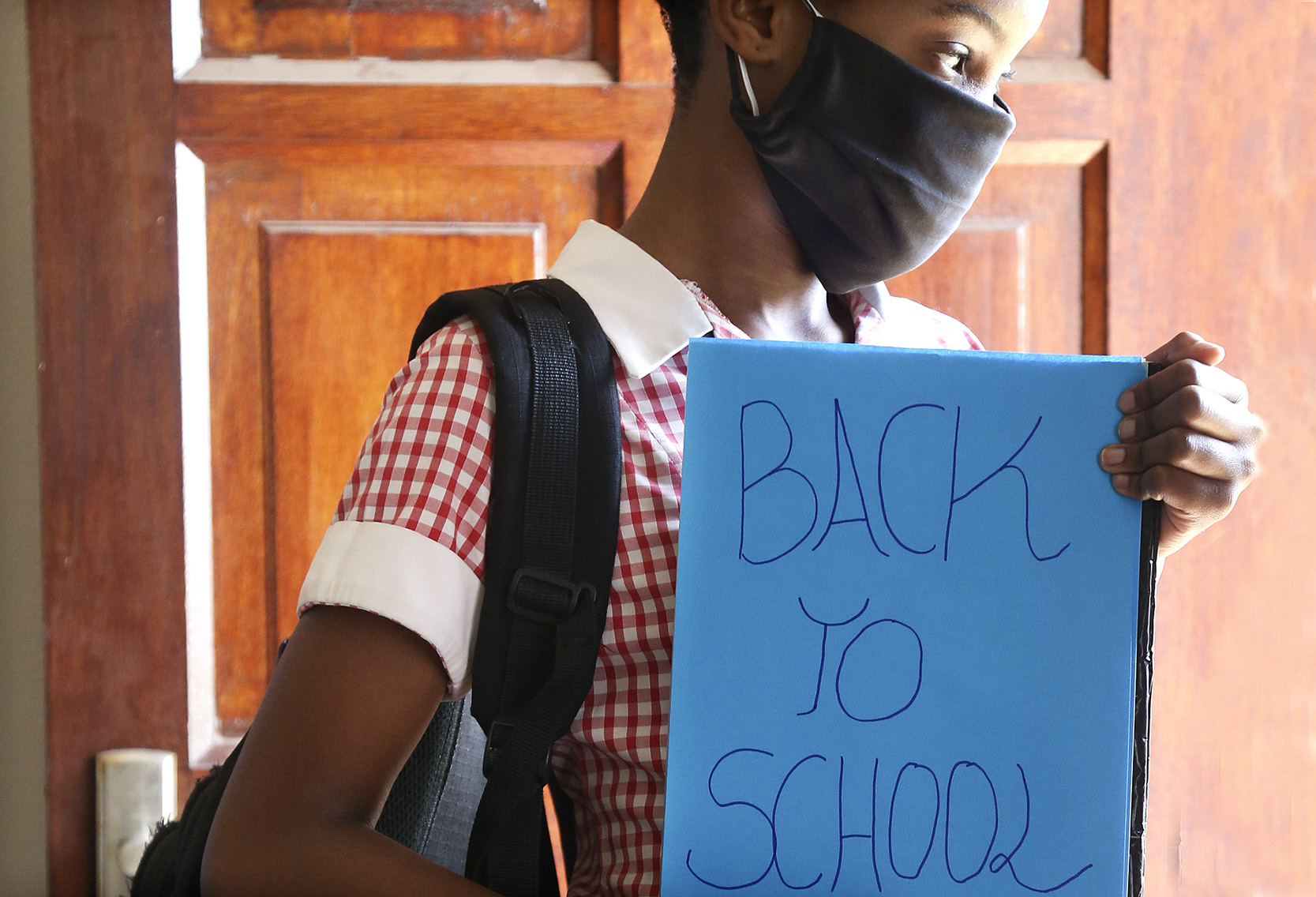Are children less infectious than adults?
“We actually do not know,” says Dr Heather Jaspan, a specialist in paediatric immunology at the University of Cape Town (UCT). “They have generally much more virus (higher viral loads) in their nasopharynx [upper part of the throat behind the nose], but whether they are able to transmit more or less is not known.”
Jaspan says that among the schools that have opened there have not been many reports of transmissions from children. “There is also some evidence that within [families] transmissions are unlikely to be from children.” This potential low transmissibility, she says, could be due to children being largely asymptomatic, meaning they create fewer droplets and aerosols which transmit the virus.
The reason for this resilience in children is elusive, says Professor Haroon Saloojee, executive member of the South African Paediatric Association (Sapa). “The favoured explanations… relate to how children’s immune systems are different from adults.”
Can my child get vaccinated?
Vaccination in children and their immune response to SARS-CoV-2 are still largely under-researched, which is partly why no vaccine is currently available for children under the age of 18 (the Moderna vaccine), or in some cases, 16 (the Pfizer vaccine).
“Vaccines are not being offered to children for two main reasons. First, because of limited vaccine supplies, children have not been prioritised. That’s because they are at much lower risk of dying or getting severely ill from Covid-19 than adults. However, even if the vaccine was available, it is not approved for use in children because it has not been tested in children,” explains Saloojee.
Covid-19 vaccine trials involving children were undergoing an age de-escalation process: “They are only testing vaccine safety and immunogenicity (the vaccine’s ability to trigger an immune response) and not efficacy (whether it prevents disease). That’s simpler to do than full trials. Older children are being tested first.”
“Pfizer has enrolled more than 2,000 children aged 12 to 15 for its trial, while Moderna is studying 3,000 12- to 17-year-olds,” says Saloojee. “If successful, it will be followed by another round of testing, down to nine-year-old children. The current adolescent trials are using the same vaccine, dose and interval as used in adults. Studies in younger children and infants may identify a need for lower doses or different reactions.”
For South Africa to reach population (herd) immunity, it has been estimated that 67% of the total population need to be vaccinated, and with children comprising more than a third of the population, they will need to be vaccinated to meet the target, he says.
 Grade 7 pupil at Unika Primary School in Robindale, Johannesburg. (Photo: Gallo Images / ER Lombard)
Grade 7 pupil at Unika Primary School in Robindale, Johannesburg. (Photo: Gallo Images / ER Lombard)
Why do children hardly seem to get sick?
Reports of severe Covid-19 in children are few, but it is not entirely clear why, says Jaspan. “Kids are very unlikely to get sick. It could be due to the amount of viral receptor [ACE-2] availability in the nasopharynx, which is lower in children.” They also have fewer comorbidities, which put people at risk for more severe disease. “It also may be because children may have been more recently infected with other coronaviruses that cause the common cold, and therefore [they] have cross-reactive immunity. But, we don’t know for sure, and this is an active area of research.”
Saloojee says there are some similarities between these common cold coronaviruses and Covid-19, so children who have been exposed to them could have some immunity to Covid-19 – but again, this is only a hypothesis.
Immunity in children versus adults
According to Jaspan, some differences between immunity in children and adults may stem from the innate inflammatory responses to the virus, which causes much of the severe disease in adults, as well as Multisystem Inflammatory Syndrome in Children in adolescents.
These innate inflammatory responses include monocytes (cells that alert our bodies to infection) and macrophages (monocytes become macrophages once recruited to certain tissues of the body to destroy harmful bacteria or organisms).
Jaspan says some data suggest that innate antiviral responses in children, including Type I Interferons, may be more rapid or effective compared with adults. Type I Interferons play a role in both innate and adaptive immunity – the body’s natural or initial immune response to any infection, as opposed to an antigen-specific immune response.
“Children have a distinct immune response to SARS-CoV-2 compared with adults,” says Saloojee. “Their immunity is more adaptable to new viruses. They mount a more effective protective action against the virus and the response causes less immune-mediated tissue damage, particularly in the lung, which is what is so damaging in adults.”
 Learners at Eastbank School in Alexandra, Gauteng. (Photo: Elmond Jiyane / GCIS)
Learners at Eastbank School in Alexandra, Gauteng. (Photo: Elmond Jiyane / GCIS)
Impact on mental health and nutrition
Apart from the virus’ direct impact on children’s bodies, there are also concerns about the pandemic’s effect on their mental health and nutrition. “Overall, the research demonstrates that Covid-19 is affecting the mental health of children and adolescents and that depression and anxiety are prevalent. Additional research is needed, however, to assess the short- and long-term effects of Covid-19 on children’s overall mental health,” says Saloojee.
The closure of schools has also had a profound impact not only on the education of children, but on their mental health and nutrition. A statement released by Sapa at the beginning of the month calls for children to return to school as soon as it is safe to do so: “The role of schools in promoting community transmission of the virus is not firmly established, but in most settings schools have contributed minimally to community transmission.” Sapa supports the continued use of non-pharmaceutical interventions (masks, hand hygiene and physical distancing) and calls for teachers to be prioritised for vaccination.
Previously, Spotlight reported extensively on the pandemic and lockdown’s impact on the nutritional status of children, as well as early results from the National Income Dynamics Study – Coronavirus Rapid Mobile Survey (NIDS-CRAM) which highlighted an increase in hunger among children and in households since the hard lockdown in 2020. The results from the third wave of NIDS-CRAM are set to be released on 17 February, and the much-anticipated 2020 Child Gauge focusing on food and nutrition security, published by UCT’s Children’s Institute, on 18 February. DM/MC
This article was published by Spotlight – health journalism in the public interest.
Sign up for our newsletter.
Information pertaining to Covid-19, vaccines, how to control the spread of the virus and potential treatments is ever-changing. Under the South African Disaster Management Act Regulation 11(5)(c), it is prohibited to publish information through any medium with the intention to deceive people on government measures to address Covid-19. We are, therefore, disabling the comment section on this article in order to protect both the commenting member and ourselves from potential liability. Should you have additional information we should know about, please email letters@dailymaverick.co.za




 Learners at Eastbank School in Alexandra, Gauteng. (Photo: Elmond Jiyane / GCIS)
Learners at Eastbank School in Alexandra, Gauteng. (Photo: Elmond Jiyane / GCIS)